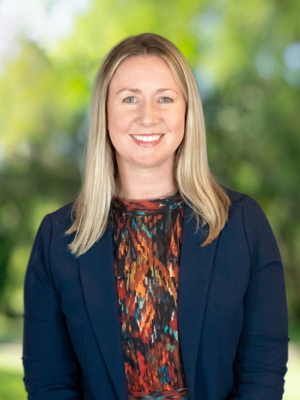 “When you reach the C-suite, you understand that you’re not supposed to know everything. You’re not meant to have every skill,” says Christine McIntyre. “What really matters is building a team with those skills and knowing how to identify and leverage their strengths to get the right things done.”
“When you reach the C-suite, you understand that you’re not supposed to know everything. You’re not meant to have every skill,” says Christine McIntyre. “What really matters is building a team with those skills and knowing how to identify and leverage their strengths to get the right things done.”
McIntyre shares how pivotal choices, purpose-driven work, and a commitment to self-awareness shaped her path to CFO. Through coaching and experience, she’s learned that great leadership starts with knowing yourself and knowing how to assemble the right mix of talent and tools to be effective.
From Investment Banker to CFO
“It’s been a winding road, one I never could have predicted,” McIntyre says of her path to CFO. A psychology major, she started out in Bank of America’s Executive Compensation group, but a well-timed connection soon pulled her into investment banking. This launched her 15-year career in public finance, where her clients were state and local governments.
Despite the excitement and pace of investment banking, something was missing. “Public finance never really captured me. It felt like the same type of deal over and over again,” she reflects. That growing disconnect led her to take a bold step: leaving investment banking to become Director of Finance at a water utility in Alexandria, Virginia. “At the time, I saw it as a step to eventually get away from the public sector work,” she says. “But instead, I fell in love with it.”
Working closely with the city she lived in, McIntyre found deep satisfaction in seeing the direct impact of her work, like financing a massive environmental project in historic Alexandria. When the utility’s CFO departed, McIntyre stepped up, eventually earning the role officially. “It was my first time as CFO and my first time on an executive leadership team — it was a tremendous experience.”
A desire to be closer to family during the pandemic brought her back to North Carolina, and after months of commuting, McIntyre landed what she knew instantly was the right next step. Now as CFO at Raftelis, she has found the perfect intersection of private-sector leadership and public-sector impact. “It’s the same client base I worked with in investment banking – cities, counties, utilities – but now I get to blend strategic leadership with direct project work, which keeps me grounded in what our clients really need.”
Natural Instincts, Sharpened with Coaching
McIntyre describes herself as a driven, energetic leader, someone who moves fast, gets things done, and brings enthusiasm to every challenge. “In some ways, leadership comes naturally to me. I’m a very hard-driving, direct person,” she says. “That kind of energy has been appreciated by my employers.”
However, she is also quick to acknowledge that leadership is not just about instinct, but rather it is a craft she has worked to refine over time. “There is a lot about leadership I had to learn,” she admits. “I’ve worked with several executive coaches throughout my career, and each one has helped me grow in different ways.”
One pivotal experience came during her time at the Alexandria utility, where the organization was preparing for a major CEO transition. A leadership coach was brought in to support the executive team, and the timing could not have been better.
“The coaching relationship was incredibly helpful. It taught me how to use my strengths, but also how to soften my edges,” she reflects. “Particularly in the public sector, I had to learn to slow down and take everyone else on the journey.”
She continues, “I’m a big proponent of coaching. Everyone has blind spots. It’s not about changing who you are, it’s about understanding your tendencies and adjusting to the context you’re working in.”
Leading Beyond Your Expertise
McIntyre sees strong leadership not as a matter of having every skill, but of understanding where you need support and how to get it. “Now that I’m further along in my career, I don’t feel the same pressure to know everything, I’ve learned to take that weight off my shoulders.”
McIntyre applies that mindset to building teams and networks. “I’m not a traditional CFO in the sense that I don’t have an accounting background. When tough accounting questions come up, I don’t pretend to know it all. I focus on finding the right resources.” In one instance, recognizing a gap in deep expertise of government accounting, she sourced a specialist through a consulting firm. “Having someone I could call made all the difference.”
Rather than defaulting to solving everything internally, McIntyre believes smart outsourcing is often the more strategic and cost-effective choice.
“Our water utility was small, so we outsourced a lot, and it was hugely beneficial. Some companies think it’s cheaper or more efficient to handle everything internally, but that’s not always the case. There are highly specialized tasks where it makes more sense to pay a consultant for 100 hours of work than to hire a full-time employee. I’ve brought that same approach to my role as CFO of Raftelis.”
McIntyre advocates for creating a roster of experts through intentional networking, actively seeking out specialists who can offer support when needed.
“If we use a certain software, I’ll seek out someone in my industry who uses it too. Those connections are gold because we can help each other in ways no one else can.”
Whether it’s tapping into external networks, attending user conferences to meet industry peers, or outsourcing specialized work, McIntyre sees her role as assembling the right mix of talent and tools. “I see myself as a resource manager and that’s a big part of what makes me effective in my role.”
Advice for Navigating Your Career
When offering advice to those a few years into their careers, McIntyre stresses the importance of not getting so caught up in the daily grind that you lose sight of the bigger picture. “It’s important to remember that your career and your job are two different things. Whether you are happy in your current job or not, you always want to think about your broader career trajectory outside of the present position,” she explains.
Building and maintaining connections, she notes, is essential for staying aware of opportunities.
“Keep up with LinkedIn and go to networking events. Don’t get so heads-down focused on being successful in your current job that you don’t also build connections outside in industry groups and peer groups.”
McIntyre also encourages professionals to remain open to unexpected opportunities rather than adhering to a rigid career path.
“There are many times where you can make lateral moves or jump to a different sector and surprise yourself,” she says. “Earlier in my career, I was too narrow in my thinking about what I was capable of, when in reality, I could do so much more than I gave myself credit for.”
Where Purpose Meets Impact
McIntyre draws inspiration from the mission-driven people she’s worked with, especially the bold, principled women in public service. “They could be doing anything with their talents, but they choose local government because they care about their community,” she says.
That sense of purpose fuels her work. From financing capital projects to leading infrastructure initiatives, she’s energized by the tangible impact. “When it’s actually happening in your community, especially a big, transformative project with environmental benefits, it’s even more exciting.”
Now, as CFO of Raftelis, McIntyre continues to see that connection firsthand. Whether it’s Baltimore, Philadelphia, or a smaller municipality, the projects Raftelis supports – often centered on clean water, infrastructure, and long-term planning – tie directly to community well-being. “We help communities figure out how to pay for it all and keep their bills affordable enough that their customers can manage them.”
That sense of purpose extends beyond work. To sustain the energy she brings to her role, McIntyre prioritizes self-care and mental clarity. “I bring a lot of enthusiasm and energy to what I do, and I can’t really turn it off,” she says. “But I know that if I keep it up all the time, I’ll burn out.” A longtime hot yoga devotee, she carves out time each week for practice and once a year, she attends a retreat, often unplugging for days at a time. “After about two days without screens your thinking hits a different level,” she says. “It gives me a broader perspective on my life without all the little distractions.”
By Jessica Robaire

